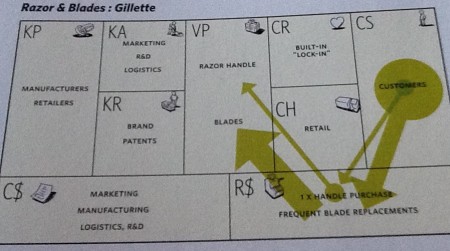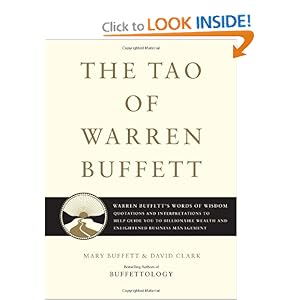57 Meditations on Kicking @$$ in Business and Life"4.8/5 stars" on Amazon
Integrity Expert Al Watts On Penn State, BP & More
Tweet CommentI recently met Al Watts, author of Navigating Integrity: Transforming Business As Usual Into Business At Its Best.
Al was kind enough to do a quick Q&A (between sailing trips) with me on the topic of business integrity.

Captain Al on his sloop LOON on Lake Superior
Q: Hi Al. Would you give a quick definition of each of your “4 Pillars Of Integrity” …
No comments yet | Continue Reading »
Friday, July 1st, 2011
The 5 Core Skills Every CEO Should Have
Tweet CommentI’ve begun to notice a pattern of what makes for the best CEO. There are five general CEO skills I believe are most important to being an excellent CEO:
1) Vision…A Clear One
A good CEO must be able to provide a clear vision of what it is the organization is doing.
What makes a good vision statement? As I wrote in 3 Tips On How To Write A Good Vision Statement, it needs to be concise, specific and answer this question for the team:
“Are we working on the right thing?”
Examples of good vision statements include:
“Making the best possible ice cream, in the nicest possible way” (Ben & Jerry’s)
“To provide access to the world’s information in one click.” (Google)
“To provide freedom and independence to people with limited mobility.” (The Scooter Store)
Check out this List Of 50 Awesome Vision Statements I compiled.
2) Mastery Of The Business Model
A good CEO masters the business model of an organization.

A good CEO knows the answers to the 9 questions in the different sections of this "Canvas."
The above image is of a “Canvas” used to master a business model (in this case, Gillette’s) from the book Business Model Generation.
The Canvas pushes you to answer 9 questions that are imperative to mastering how a business should work.
The 9 questions to answer are represented above by a two letter acronym…such as KP for “Who are your Key Partnerships?”).
If found it most effective to answer the 9 questions in this order:
No comments yet | Continue Reading »
Wednesday, February 16th, 2011
Warren Buffett’s 3 Simple Tips On Who To Hire
Tweet 4 CommentsI’ve been thinking a lot about hiring lately.
I’m working on starting a new business and I also coach others on starting their own businesses – and hiring is perhaps the most important decision a business leader can make (you may recall how I previously wrote about a mishire costing you a cool $1 million).
I like formulas & frameworks and I’ve been keeping my eye out for a good one for hiring — I found a simple one from investor Warren Buffett.
He says there are just 3 criteria that every good hire should have: Integrity, Intelligence and Energy.
1) Integrity
Does this person consistently exhibit a soundness of character? Are they, in a word, honest?
One good tip on figuring this out is to use Warren Buffett’s “newspaper front page” test.
Let’s pretend the potential hire is named Bernard.
If a New York Times reporter had access to the work that Bernard did for you, would you comfortable opening up the paper tomorrow and reading their analysis of Bernard?
If the answer is yes, Bernard is probably of good integrity…if you’re thinking too much about that, you might have a problem with old Bernie.
A favorite quote of mine on honesty/integrity comes from Mark Twain:
“If you tell the truth you don’t have to remember anything.”
Another good quote from unknown sources is:
“Hire for character, don’t hire characters
2) Intelligence
Raw intelligence is important.
Did a person test well in a competitive environment (such as grades in University or on a standardized test like the SATs).
I just met with one engineer today in part because he scored a 1,480 on his SATs and that’s higher than most people I know.
But it doesn’t have to be academic intelligence.
It can be “Street Smarts” – The ability to quickly read situations and people.
Or it could be “Emotional Intelligence” – the skills to create optimal results in your relationship with yourself and others.
3) Energy
By energy, I couldn’t find Buffett’s definition of it but here’s mine:
Good energy in a hire is when they feel motivated about a task at hand.
For example, most people consider me high-energy about most things: I care deeply about new Internet businesses, hiring & making the world a better place – so when I’m working on those things, you’ll find me at a high-energy level.
But there are tasks that you’ll find me much lower energy on, such as paying my bills or filling out a rebate form to get $100 back for my contact lenses.
So, if you need help with your paperwork, please do not consider me a good candidate!
But If They Don’t Have Integrity, The Other Two Will Kill You
Now, ideally you want all three criteria — Integrity, Intelligence and Energy — to be met when hiring employees.
But there is one that trumps them all: Integrity.
Why?
The reason, as Buffett explains, is that if you have the other two: an intelligent person who is high-energy about what they’re doing, but they’re missing the third (they are low-integrity (e.g. dishonest)), then that is a Perfect Storm of financial disaster.
Case in point: Bernie Madoff (you like how I moved to the real -life Bernie from the hypothetical “Bernard”?).
Clearly, Bernie was an intelligent man – he had the respect of a Who’s Who of Wall Street people.
And he was high-energy at what he did– was able to talk 1,000’s of people into hiring him to manage their savings; and hid his fraud for what investigators believe was over 30 years!
He even duped a couple of very smart people I know.
And Bernie served on a number of boards (including Yeshiva University’s Business School and Gift of Life Bone Marrow Foundation) and was clearly a high-energy multi-tasker.
So, I think Bernie qualifes as an intelligent and energized person…but he was low-integrity…and he robbed people blind.
To recap, there are three things that a good hire (or anyone you work with) should possess:
- Integrity
- Intelligence
- Energy
But to save yourself time, make sure they have the first (Integrity) because the next two don’t matter without it.
4 comments so far (is that a lot?) | Continue Reading »
Sunday, September 26th, 2010
Jack Ma: Alibaba Will Be Bigger Than Microsoft & Walmart
Tweet CommentThere was a great interview of Jack Ma on Charlie Rose — Ma is the Founder and Chairman of the leading Chinese Internet company Alibaba.
Ma is clearly an evolved thinker. Here are some highlights:
An Internet CEO Does Not Need To Be Technical
- Jack Ma doesn’t know how to code
- He says he uses the Web primarily to send and receive email and browse the Web
The Core Competency of Alibaba is Culture
- Grew from 18 to 20,000 people. We believe the customer is #1, employee #2 and shareholders #3
- Average age of employees is 26
- “It’s the customer that pays us the money.”
- “It’s the employee who drives the innovation.”
- Shareholders come and go (I’m paraphrasing).
What Types of Customers Does Alibaba Target?
- Focus is small and medium-sized businesses.
“I’ve seen people make a fortune catching shrimps (small customers) but never make a fortune catching sharks and whales (big customers).”
- Has 2 Million Small & Medium Sized Businesses In The U.S. Already
What Ideas Excite Jack Ma
“To be a great company, think about what social problem you can solve.”
“Anything happening in the USA will happen in China (cloud computing, mobile).”
Should US Businesses Be Excited About China Market?
- USA should be optimistic about China market…1.3 billion people…huge demand.
- This should continue for another 20 oe 30 years at least
How Big Can Alibaba Get?
“We should surpass Microsoft and Walmart (in size)”
“I would regret if we can’t be bigger than Walmart”…because Taobao and Alibaba goes after both businesses and consumers (while Walmart sold only to consumers).
On What Do Do With Wealth Creation
“I’ve never thought the money I have belongs to me…it belongs to society.”
“You have a couple of million you’re a rich guy” (I think he’s saying that you don’t need any more than that for yourself)
“You have $20 to 30 million it’s capital” (presumably for a business)
“You have $100 million, it’s a social responsibility.” (i.e. you should give it back)
He certainly speaks like a true leader.
No comments yet | Continue Reading »
Saturday, May 22nd, 2010
How To Determine Your Business Values: Exercises, Examples & Top Lists
Tweet 3 CommentsDo you know what your business’s values are?
I believe that your corporate values may be THE most important asset in enhancing your company’s long-term monetary value.
Your strategies and trends will come and go — your values can be forever!
This article will help answer the top questions you need to know about corporate values, such as:
- What are values?
- Why are values important?
- How do you determine your values (including a “values exercise”)?
- What are some business examples of values?
Here we go…!
What are values?
My definition of values is simple: Values are deeply-held beliefs about the right way of doing things.
Each individual operates life with their own set of values…and, of course, a business should as well.
Why are values important to a business?
As the author Jim Collins penned:
“The founders of great, enduring organizations like Hewlett-Packard, 3M, and Johnson & Johnson often did not have a vision statement when they started out. They usually began with a set of strong personal core values…”
It is your values that will guide you through the toughest decisions you make…you know, those 50-50 calls that every business leader faces periodically.
How do you determine your business values?
Here’s an easy values exercise Jim Collins suggests (with my own twists on it after going through a couple):
- Sit down with your team.
- Imagine that you need to create a mini-version of your company on Mars…
- …And you have to send a few people (up to 7) from your company on a spaceship to Mars to represent your business’s best attributes.
- Identify the handful of employees you’d send on the spaceship (you can’t vote for yourself (and, ideally (if your company is large enough), you aren’t allowed to select anyone on the team doing the exercise)
- Now examine those people that your team identified and list out the values/attributes they possess that made you vote for them (e.g. Jane operates with integrity,Ralph strives for excellence, etc.)
- You should have a list of 10 or more business values at this point
- Start poking holes at each business value (you can use real-life business challenges/successes to test each business value to see if it is indeed true)
- Some values might be redundant with each other so start shrinking your list (I recommend you get it down to 8 or fewer values)
- Wordsmithing — Once you come up with the list of 8 or fewer values you may want to wordsmith them in a way that’s more of a commitment
Examples of Business Values
There are numerous examples of business values out there — here are a few of companies I’m familiar with:
Hot Topic Media’s Values — Here’s an example of values our team came up with:
- We treat our customers, partners & employees with dignity and respect
- We do what we say, and we own what we do
- We give our customers more value than they expect
- We are good shepherds of our company’s assets
- We leave the world a better place than we found it (the “Campsite Rule”)
- We are proud of what we do and have fun doing it
- We keep things simple and clear
Google’s Values — Google has a version of values it calls “Our Philosophy: Ten Things We Know To Be True”
- Focus on the user and all else will follow
- It’s best to do one thing really, really well
- Fast is better than slow
- Democracy on the web works
- You don’t need to be at your desk to need an answer
- You can make money without doing evil
- There’s always more information out there
- The need for information crosses all borders
- You can be serious without a suit
- Great just isn’t good enough
Hewlett Packard’s Values — HP Calls these their “Shared Values”:
- Passion for customers — We put our customers first in everything we do.
- Trust and respect for individuals — We work together to create a culture of inclusion built on trust, respect and dignity for all.
- Achievement and contribution — We strive for excellence in all we do; each person’s contribution is key to our success.
- Results through teamwork — We effectively collaborate, always looking for more efficient ways to serve our customers.
- Speed and agility — We are resourceful, adaptable and achieve results faster than our competitors.
- Meaningful innovation — We are the technology company that invents the useful and the significant.
- Uncompromising integrity — We are open, honest and direct in our dealings.
BabyCenter’Values — Johnson & Johnson subsidiary BabyCenter calls it these their “Operating Principles”:
- Operate with Integrity — Always
- Our Sucess Starts with Our People
- Be Customer-Driven
- Strive for Excellence
- Work Together to Make Decisions
- Everyone Needs Feedback
- Respect One Another
- Face Facts Constructively
A final point: values aren’t just something to write down (or put on a coffee mug as some do).
Values must be based on the real-life actions of a business.
And it starts with leadership — exemplifying their values through their actions and decisions.



